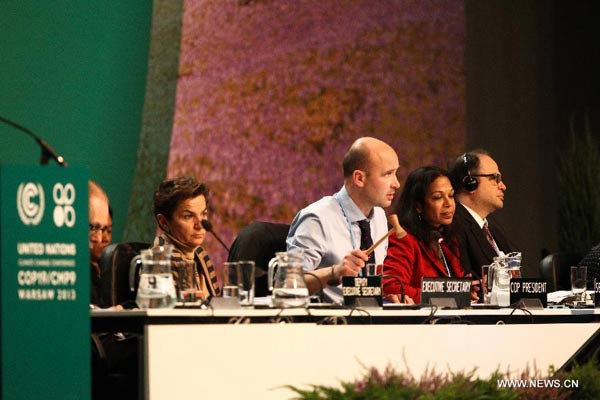UN talks agree on major principles
 0 Comment(s)
0 Comment(s) Print
Print E-mail Xinhua, November 24, 2013
E-mail Xinhua, November 24, 2013
|
|
|
Marcin Korolec (3rd R), President of COP19/CMP9, knocks a hammer as he announces the final agreements at the closing plenary of the 2013 UN Climate Change Conference in Warsaw, Poland, on Nov. 23, 2013. The United Nations climate talks on Saturday agreed on some major principles in Warsaw for a new global climate pact due to be agreed on in 2015 and enter into force after 2020. [Photo/Xinhua] |
The United Nations climate talks on Saturday agreed on some major principles in Warsaw for a new global climate pact due to be agreed on in 2015 and enter into force after 2020.
As the two-week-long negotiations were approaching the 18th hour of extra time, it was agreed that all countries should prepare "intended nationally determined contributions" to help cut carbon emissions.
The agreement was seen as a key step paving the way for all countries to reach an ambitious global climate pact in 2015, and a sign of their desire to avert a breakdown of the climate talks.
Another hurdle threatening to derail the climate talks has also been largely cleared as thousands of negotiators from nearly 200 countries adopted a decision on climate change aid.
The talks called on developed countries to mobilize finance assistance from government channels "at increasing levels" from the 10 billion U.S. dollars a year paid out from 2010 to 2012.
According to previous deals, developed countries should provide 100 billion U.S. dollars a year to poorer countries after 2020 to help developing countries cope with climate change.
However, the promise has been largely unfulfilled, and developed nations had been resisting to set finance targets for the period between 2013 and 2019.
Negotiators are still quarrelling over whether to create a mechanism designed to help vulnerable nations to deal with the losses and damage caused by global warming, a third and final hurdle to overcome for the talks.







Go to Forum >>0 Comment(s)